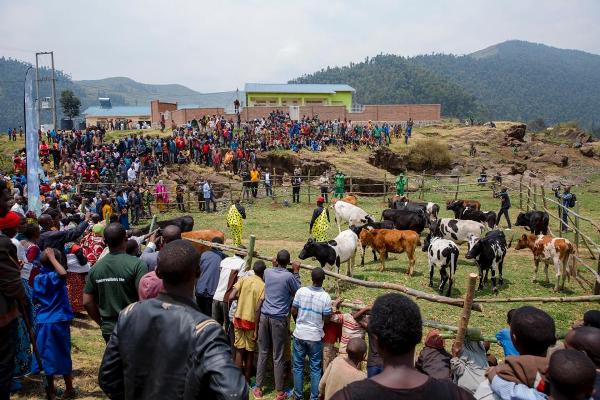
Official handing over cows to vulnerable families living around Volcanoes National Park
Nyabihu: As part of its tourism revenue share program, RDB (Rwanda Development Board) today handed over 729 cows to vulnerable families living around the Volcanoes National Park. Every year, RDB uses 10% of revenues generated from tourists visiting the country’s national parks to fund projects aimed at improving the livelihoods of communities living around the parks.
The handover, which took place today in Nyabihu District, Western Province, is one of 36 projects that the Government spent Rwf 1.5 billion on during the last fiscal year (2018-2019).
This is up from Rwf 741 million spent in 2017-2018. Overall park revenues reached over US$ 21.1 million (Rwf 19 billion) in 2018.
These projects have availed clean drinking water, milk, health centers, classrooms and housing to members of the communities living around the three national parks: Akagera National Park, Nyungwe National Park and Volcanoes National Park.
The program has existed since 2005 and over Rwf 5.2 billion has been spent on 647 community projects since.
Speaking to gathered residents of Nyabihu after the handover, Belise Kariza, the RDB Chief Tourism Officer said:
“The tourism revenue share program helps improve the lives of communities living around the national parks and also makes them love the parks. Every year, these communities take ownership of the parks and their conservation more importantly and this is what makes our conservation initiatives succeed. This year, thanks to the collaboration with the local authorities, we were able to identify the vulnerable communities’ needs and are glad that the families will be drinking milk everyday knowing that they earned it from tourism. It is also my hope that two years from now, the number of cattle we have handed over today will quadruple and benefit even more families.”
The Governor of the Western Province, Alphonse Munyantwali thanked RDB for the revenue share program, noting:
“When the revenue share program started, the communities surrounding the parks used to receive about Rwf 100 million. Today, the figure has grown to Rwf 1.5 billion, which is a big achievement. I appreciate the fact that today a person that used to set traps for animals in the parks is now able to get milk and other basic needs on a daily basis. Let’s continue protecting the parks so that our region can continue earning more from tourism which will improve people’s lives.” (End)
